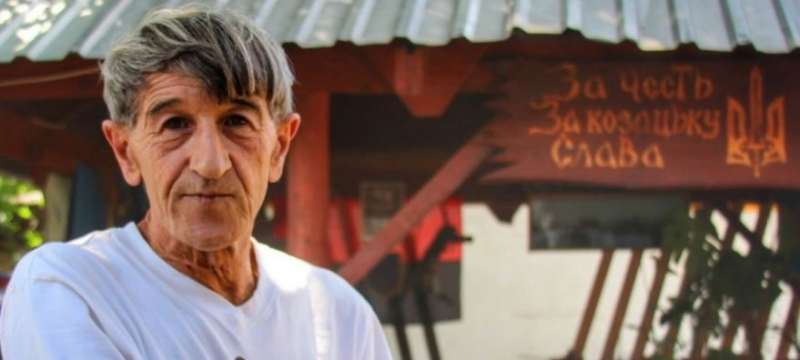Bizarre new charge against Ukrainian activist jailed for opposing Russian occupation of Crimea

Russian ‘investigators’ have charged 61-year-old Crimean Oleh Prykhodko with planning to blow up the Russian general consulate in Lviv, Western Ukraine. The new charge seems bizarrely implausible, but then so does everything about this case.
Prykhodko was arrested a month and two days after Russia released several prominent Ukrainian political prisoners in exchange for MH17 suspect Vladimir Tsemakh. The men released included Volodymyr Balukh, another Ukrainian from Crimea whose case bore eerie similarities to that now facing Prykhodko. In both cases, the ‘evidence’ against them appears to have been planted, almost certainly because of the Ukrainian flag that they both flew over their property and their open opposition to Russian occupation.
Prykhodkho’s lawyer, Nazim Sheikhmambet first reported that new charges had been laid back in January, however on that occasion, the change really only added another article of Russia’s criminal code to the existing charge.
Now, Sheikhambet has seen the case material and been able to provide information about a supposedly new ‘incident’, which is also qualified under Article 205 § 1 of Russia’s criminal code (‘planning a terrorist attack’). It is claimed that Prykhodko was planning an arson attack on the General Consulate “in order to impact the taking of the decision by the authorities of the Russian Federation of the need for the Republic of Crimea to be part of Ukraine.” He allegedly found some person in mainland Ukraine, whom the investigators have not identified. They do, however, claim that he rang this unidentified individual and proposed carrying out the above-mentioned attack. The investigators claim that he subsequently had a text message conversation with this individual and planned the attack during October 2019.
At a detention hearing on 5 February, ‘judge’ Denis Didenko, from the Russian-controlled Kievsky District Court in Simferopol, extended Prykhodko’s detention, formally until 10 April. In response to Sheikhmambet’s objections, the investigators claimed that Prykhodko is the citizen “of a foreign country” (he is Ukrainian) and that “in view of his personality and position, no other preventive measure, aside from isolation from society, will ensure his procedural behaviour”.
The court bailiffs initially tried to prevent people from attending the hearing, claiming that it was closed to the public. They backed down only after Sheikhmambet intervened. Since there was no mention of the hearing on the court website, it seems likely that the attempt to hold it behind closed doors was deliberate.
Prykhodko was arrested in the late evening on 9 October 2019 after the FSB turned up and carried out ‘an inspection” of Prykhodko’s garage. Judging by video footage, Prykhodko was not allowed into the garage and the FSB almost certainly had ‘witnesses’ whom they had brought with them. They allegedly ‘found’ a TNT type 200 explosive, a detonator for UZRGM-2 and cut welding arcs, supposedly for insertion within the explosive device. They claimed that Prykhodko had been planning to blow up the local administration building, but that the FSB had prevented this .Prykhodko was taken away, and remanded in custody the following day.
Another ominous similarity with previous politically motivated prosecutions is that the FSB illegally took DNA samples from Prykhodko. Sheikhmambet explains that on 9 October, after he was brought to the FSB in Simferopol, a person came up to him, claiming to be a doctor. Claiming that this was part of an examination, the individual asked him to open his mouth and with a cotton wool tampon, he took DNA samples.
Without any procedural safeguards in place, such ‘traces’ are likely to be added to the items which Prykhodko is adamant were not in his garage before the FSB arrived.
The combination of planted explosives, daubed with illegally obtained DNA traces, which is unfolding in the prosecution of Ukrainian activist Oleh Prykhodko, has already been used against at least three Ukrainian political prisoners whom Russia designated as ‘saboteurs’. No actual crime is needed, and the ‘courts’ understand their role in the persecution far too well to ask inconvenient questions.
61-year-old Prykhodko had, from the beginning, made his opposition to Russian occupation of his Ukrainian homeland very clear, and had already suffered various forms of harassment, including at least one search. This is of major relevance since, just like Volodymyr Balukh, Prykhodko had every reason to expect a new FSB visitation. Even had he genuinely possessed explosives, he would hardly have stored them where they would immediately be found by the FSB.
Without any credible evidence of criminal behaviour, Prykhodko is now charged under three articles of Russia’s illegally applied criminal code: Article 205 § 1 (planning terrorist acts in Sudak (Crimea) and Lviv in Western Ukraine; Article 223.1 (illegally preparing explosive substances) and 222.1 § 1 (purchasing or storing explosives).





